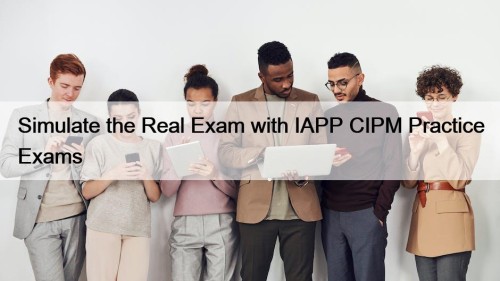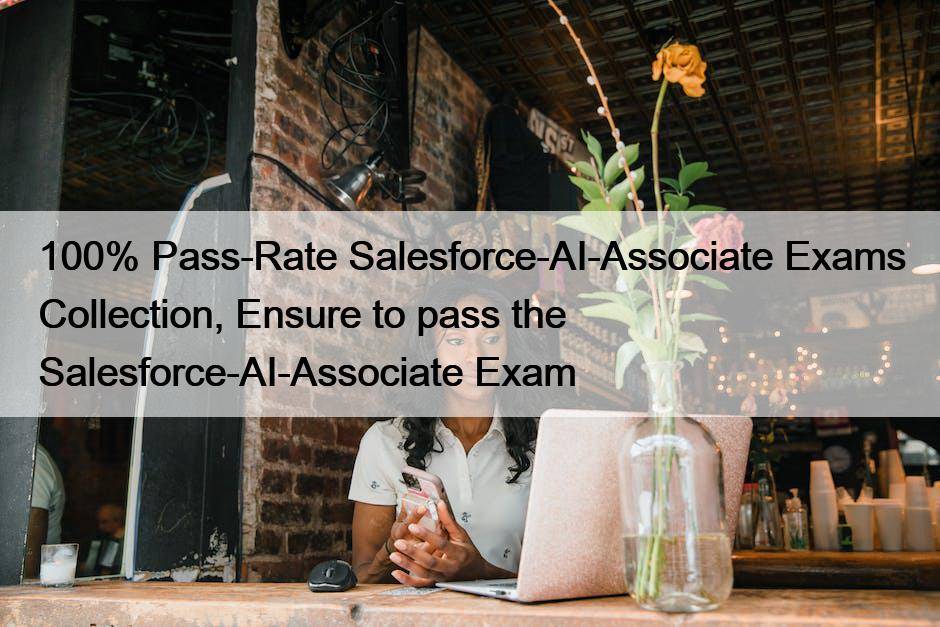Most Popular
 MLA-C01 Latest Test Cram, MLA-C01 Test Pdf
MLA-C01 Latest Test Cram, MLA-C01 Test Pdf
Do you want to obtain your MLA-C01 exam dumps as ...
 H3C GB0-713 Dump Torrent, Questions GB0-713 Exam
H3C GB0-713 Dump Torrent, Questions GB0-713 Exam
Considering all customers’ sincere requirements, GB0-713 test question persist in ...
 Simulate the Real Exam with IAPP CIPM Practice Exams
Simulate the Real Exam with IAPP CIPM Practice Exams
What's more, part of that GuideTorrent CIPM dumps now are ...



100% Pass-Rate Salesforce-AI-Associate Exams Collection, Ensure to pass the Salesforce-AI-Associate Exam

Our company hired the top experts in each qualification examination field to write the Salesforce-AI-Associate prepare materials, so as to ensure that our products have a very high quality, so that users can rest assured that the use of our research materials. On the other hand, under the guidance of high quality Salesforce-AI-Associate research materials, the rate of adoption of the Salesforce-AI-Associate exam guide is up to 98% to 100%. Of course, it is necessary to qualify for a qualifying Salesforce-AI-Associate exam, but more importantly, you will have more opportunities to get promoted in the workplace.
Salesforce Salesforce-AI-Associate Exam Syllabus Topics:
| Topic | Details |
|---|---|
| Topic 1 |
|
| Topic 2 |
|
| Topic 3 |
|
| Topic 4 |
|
>> Salesforce-AI-Associate Exams Collection <<
Salesforce Salesforce-AI-Associate Training Questions & Salesforce-AI-Associate Valid Test Sample
The price of Our Salesforce-AI-Associate practice guide is affordable, and you can always find that from time to time, we will give some promotion for our worthy customers. Meanwhile, we provide the wonderful service before and after the sale to let you have a good understanding of our Salesforce-AI-Associate Study Materials. Our service are working at 24/7 online to give you the best and the most professional guidance on our Salesforce-AI-Associate learning braindumps.
Salesforce Certified AI Associate Exam Sample Questions (Q36-Q41):
NEW QUESTION # 36
Which action should be taken to develop and implement trusted generated AI with Salesforce's safety guideline in mind?
- A. Develop right-sized models to reduce our carbon footprint.
- B. Be transparent when AI has created and automatically delivered content.
- C. Create guardrails that mitigates toxicity and protect PII
Answer: C
Explanation:
Explanation
"Creating guardrails that mitigate toxicity and protect PII is an action that should be taken to develop and implement trusted generative AI with Salesforce's safety guideline in mind. Salesforce's safety guideline is one of the Trusted AI Principles that states that AI systems should be designed and developed with respect for the safety and well-being of humans and the environment. Creating guardrails means implementing measures or mechanisms that can prevent or limit the potential harm or risk caused by AI systems. For example, creating guardrails can help mitigate toxicity by filtering out inappropriate or offensive content generated by AI systems. Creating guardrails can also help protect PII by masking or anonymizing personal or sensitive information generated by AI systems."
NEW QUESTION # 37
A customer using Einstein Prediction Builder is confused about why a certain prediction was made.
Following Salesforce's Trusted AI Principle of Transparency, which customer information should be accessible on the Salesforce Platform?
- A. A marketing article of the product that clearly outlines the oroduct's capabilities and features
- B. An explanation of how Prediction Builder works and a link to Salesforce's Trusted AI Principles
- C. An explanation of the prediction's rationale and a model card that describes how the model was created
Answer: C
Explanation:
Explanation
"An explanation of the prediction's rationale and a model card that describes how the model was created should be accessible on the Salesforce Platform following Salesforce's Trusted AI Principle of Transparency.
Transparency means that AI systems should be designed and developed with respect for clarity and openness in how they work and why they make certain decisions. Transparency also means that AI users should be able to access relevant information and documentation about the AI systems they interact with."
NEW QUESTION # 38
In the context of Salesforce's Trusted Al Principles, what does the principle of Responsibility primarily focus on?
- A. Outlining the technical specifications for Al integration
- B. Ensuring ethical use of Al
- C. Providing a framework for data model accuracy
Answer: B
Explanation:
The principle of Responsibility in Salesforce's Trusted AI Principles primarily focuses on ensuring that AI is used ethically. This includes making sure that AI technologies are developed and implemented in ways that are transparent, fair, and accountable, with a strong emphasis on the impact on individuals and society. The principle encourages organizations to take responsibility for the outcomes of their AI systems and to avoid unintended consequences that could harm users or society.
NEW QUESTION # 39
What is a possible outcome of poor data quality?
- A. Biases in data can be inadvertently learned and amplified by AI systems.
- B. AI predictions become more focused and less robust.
- C. AI models maintain accuracy but have slower response times.
Answer: A
Explanation:
"A possible outcome of poor data quality is that biases in data can be inadvertently learned and amplified by AI systems. Poor data quality means that the data is inaccurate, incomplete, inconsistent, irrelevant, or outdated for the AI task. Poor data quality can affect the performance and reliability of AI systems, as they may not have enough or correct information to learn from or make accurate predictions. Poor data quality can also introduce or exacerbate biases in data, such as human bias, societal bias, or confirmation bias, which can affect the fairness and ethics of AI systems."
NEW QUESTION # 40
What is a key challenge of human AI collaboration in decision-making?
- A. Creates a reliance on AI, potentially leading to less critical thinking and oversight
- B. Reduce the need for human involvement in decision-making processes
- C. Leads to move informed and balanced decision-making
Answer: A
Explanation:
"A key challenge of human-AI collaboration in decision-making is that it creates a reliance on AI, potentially leading to less critical thinking and oversight. Human-AI collaboration is a process that involves humans and AI systems working together to achieve a common goal or task. Human-AI collaboration can have many benefits, such as leveraging the strengths and complementing the weaknesses of both humans and AI systems. However, human-AI collaboration can also pose some challenges, such as creating a reliance on AI, potentially leading to less critical thinking and oversight. For example, human-AI collaboration can create a reliance on AI if humans blindly trust or follow the AI recommendations without questioning or verifying their validity or rationale."
NEW QUESTION # 41
......
Our website gives detailed guidance to our customers for preparation of Salesforce-AI-Associate actual test and take them towards the direction of achievement. Each of our Salesforce exam preparation materials is designed by IT professionals in order to improve your particular skills. Our Salesforce-AI-Associate Practice Questions will boost the confidence of candidates for appearing in the real exam.
Salesforce-AI-Associate Training Questions: https://www.trainingdumps.com/Salesforce-AI-Associate_exam-valid-dumps.html
- Reliable Salesforce-AI-Associate Dumps Ppt 🥝 Salesforce-AI-Associate Interactive Course 🧾 Salesforce-AI-Associate Certification Dump 👵 The page for free download of ▶ Salesforce-AI-Associate ◀ on ➥ www.dumps4pdf.com 🡄 will open immediately 🍨Valid Salesforce-AI-Associate Practice Questions
- Real Salesforce-AI-Associate Exam Answers 🪀 Salesforce-AI-Associate Exam Dumps Pdf 🚎 Salesforce-AI-Associate Interactive Course 📒 Download { Salesforce-AI-Associate } for free by simply searching on ➠ www.pdfvce.com 🠰 ⛺Valid Salesforce-AI-Associate Practice Questions
- Salesforce-AI-Associate Exam Questions Fee 🏍 Latest Salesforce-AI-Associate Learning Material ⛪ Valid Salesforce-AI-Associate Practice Questions 🏯 Simply search for 《 Salesforce-AI-Associate 》 for free download on ▶ www.dumps4pdf.com ◀ 🔪Reliable Salesforce-AI-Associate Test Pattern
- Quiz 2025 High Hit-Rate Salesforce Salesforce-AI-Associate: Salesforce Certified AI Associate Exam Exams Collection 🧫 Search for ✔ Salesforce-AI-Associate ️✔️ and obtain a free download on ⏩ www.pdfvce.com ⏪ 🐧Latest Salesforce-AI-Associate Test Cost
- Salesforce-AI-Associate Actual Exam - Salesforce-AI-Associate Study Materials - Salesforce-AI-Associate Test Torrent 📝 Open website { www.examdiscuss.com } and search for ⏩ Salesforce-AI-Associate ⏪ for free download 🧆Reliable Salesforce-AI-Associate Test Pattern
- Latest Salesforce-AI-Associate Test Cost 🎡 New Salesforce-AI-Associate Test Guide 🥡 Training Salesforce-AI-Associate Solutions 🏑 Search for [ Salesforce-AI-Associate ] and download it for free on ☀ www.pdfvce.com ️☀️ website 🟤Reliable Salesforce-AI-Associate Exam Sample
- Free download Salesforce certification Salesforce-AI-Associate exam practice questions and answers 📘 Immediately open { www.passcollection.com } and search for ✔ Salesforce-AI-Associate ️✔️ to obtain a free download 🏁Valid Exam Salesforce-AI-Associate Blueprint
- Latest Salesforce-AI-Associate Exam Guide ✏ Salesforce-AI-Associate Exam Questions Fee 🏕 Training Salesforce-AI-Associate Solutions 🟡 Open ⮆ www.pdfvce.com ⮄ and search for ➤ Salesforce-AI-Associate ⮘ to download exam materials for free 🚹Valid Salesforce-AI-Associate Practice Questions
- Verified Salesforce Salesforce-AI-Associate Exams Collection Strictly Researched by Salesforce Educational Trainers 🚟 Search for ➠ Salesforce-AI-Associate 🠰 on ➤ www.lead1pass.com ⮘ immediately to obtain a free download 🐳Salesforce-AI-Associate Interactive Course
- Pdfvce Salesforce-AI-Associate Cert Guide 🐩 Easily obtain free download of ➠ Salesforce-AI-Associate 🠰 by searching on ✔ www.pdfvce.com ️✔️ 🔁Salesforce-AI-Associate 100% Accuracy
- Salesforce-AI-Associate Actual Exam - Salesforce-AI-Associate Study Materials - Salesforce-AI-Associate Test Torrent 🌖 Easily obtain “ Salesforce-AI-Associate ” for free download through ➤ www.examsreviews.com ⮘ 🎀Reliable Salesforce-AI-Associate Test Pattern
- Salesforce-AI-Associate Exam Questions
- zevroc.com lms.benchmarkwebsoft.com bicfarmscollege.com lore.limemarketing.com.br www.tektaurus.com anandurja.in legal.academiadeamparoindirecto.com digitalenglish.id excelmanindia.com megagigsoftwaresolution.com.ng
Tags: Salesforce-AI-Associate Exams Collection, Salesforce-AI-Associate Training Questions, Salesforce-AI-Associate Valid Test Sample, Salesforce-AI-Associate New Dumps, Valid Test Salesforce-AI-Associate Vce Free